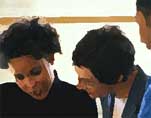Interview with Ron PoirierPresidential Award for Secondary Science Teaching, 1998 |
 |
Ron Poirier began making presentations during his 31-year middle school, high school, and university teaching career. He became a trainer of teachers and administrators on using computers and started giving presentations at regional and national teacher conferences. He is currently head of the science department at Winman Junior High School in Warwick, Rhode Island.
How did you get started in giving presentations?
The first presentation I did was for one of the regional science teachers association meetings. I gave a short demonstration and talk, “Computers in the Classroom, Lower Cost Alternatives.” I just wanted to share it with people. I took a student along with me, and we just basically showed what we’d been working on in the classroom.
What advice would you give to a teacher who wants to get involved in giving presentations?
We all have good ideas, and I would encourage people to try to share those ideas with others. The advice I would give is not to put yourself down. Whether you think your ideas are spectacular or not, you've got something to offer that other people want to hear about. I think it’s important to let people know what you're working on. The beauty of doing a presentation is that sometimes people in the audience will give you better ideas than you had to begin with. You learn as much by giving the presentation as you think you're giving the audience.
Reflecting on your teaching is very important. If you're reflecting on what you're doing, you're giving the kids a bit more than the norm. That's where you get ideas that you feel comfortable presenting, because perhaps nobody else thought of doing things this way before. And there's nothing like showing how what you're presenting improves student performance. That's what we're all about, and nothing excites and motivates teachers more than an idea that works to benefit the students.
My advice would be to start with teachers within your own building. It might not be a formal presentation, but I found that sharing ideas I was working on with other people was really encouraging. Have your colleagues add comments or make suggestions. Once you get to a point where you're comfortable, then try presenting at a state science teachers association meeting or a regional NSTA meeting. This is a good place to start because you get to meet people from your own discipline from around the state. Then you can move up to national conferences.
How do you make yourself more comfortable and confident before a presentation?
You never know what presenting will be like until you try. As you do more presentations, you’ll get more and more comfortable or less and less uncomfortable. I think a big part of that discomfort is not believing that your ideas are worth sharing. Being adequately prepared will also make you feel more comfortable. Another piece of advice is to start out by giving presentations with a colleague. They can help you if you get stuck.
How do you juggle your teaching responsibilities with making presentations?
At this point in my life, I have a bit more free time to be active in giving presentations. I was less active when I was a younger teacher with family responsibilities. But, I also think it takes several years to really feel comfortable with what you're doing. It just takes that much experience and that much reflecting on your teaching.
What advice would you give teachers presenting to parents?
We have open houses twice a year and parents want to hear about how their kid is doing. But I try to focus on talking about the program. Describe how often you give homework, grading, the approach you use, the sorts of projects you give the kids, and your expectations in terms of what they'll be producing as well as in terms of classroom behavior. It’s important to tailor your presentation to fit such a short format.
What advice would you give to teachers presenting to the school board?
It’s really important to have your facts straight. Make sure you understand what you're talking about because somebody will ask a question that may seem off the wall and you need to be able to give a quick answer. Be able to think on your feet.
What advice would you give to teachers presenting to the state education committee?
That type of presentation requires a tremendous amount of preparation. That way you can answer any questions that they have. The more you're prepared, the more comfortable you feel. By the time I do the presentation, it’s just a matter of delivery and the facts are there.
What advice would you give to teachers giving a hands-on presentation?
For the RITTI program, we gave computer training to 25 percent of all public school teachers in the state of Rhode Island. My philosophy was to limit my presentation to no more than 15 minutes of showing the basics. People would then start working on computers, and our job as trainers was to walk around and answer any individual questions and give one-on-one help. For the more "advanced" participants, we offered breakout sessions on higher-level features of the software, and we had daily discussions on how this tool may be used to simplify the participants' work. By the end of the two weeks, they were helping each other as much as we were. Somebody would learn something and it would very quickly pass through the crowd. People had a good time with what they were doing.
What advice would you give teachers giving a short presentation?
Stay to the point. If you’ve only got a certain number of minutes, then try to stay focused and get right to the root of the issue.
How does your presentation style differ when presenting to teachers you work with versus teachers you don’t know?
When you’re presenting to teachers you work with, be kind of loose. I think it’s important to keep that collegial attitude going. They know you and they don’t expect you to be an expert at what you're doing. But they do expect to learn something from you.
For teachers you don’t know, what works for me is to get there early and try to get to know the audience a bit. Before the presentation, I try to get a little conversation going to find out what a few people expect to get from this. Then you can reflect back on it during your presentation and explain how the presentation is meeting their expectations. Again, it’s important to be well prepared. That way you are able to juggle things around and modify things at the last minute if need be.
How do you think your experiences in making presentations contribute to the advancement of science reform?
I have chosen topics that revolve around helping teachers find methods that should help students research science topics and learn through their own research. For example, I gave a presentation on using the Internet to discover Kepler's laws of planetary motion by looking at the motions of satellites around the earth in real time using data. In this guided inquiry, students were able to study the shape of the satellite orbits paths, satellite speeds in relation to distance from the earth, and the relationship between orbital radius and period of orbit of a satellite. This approach works well to help students meet the inquiry standard and develop a much deeper understanding of what Kepler's laws mean.
My most recent interest is in helping students read for comprehension. I intend to relate my experiences at the next national NSTA conference. My students use the Internet to research topics for their own presentations. Since most Web pages are written at a level a bit above the junior high level, students need to develop strategies to glean important information from Web sites, and they need to be able to evaluate which sites are valid sources of information and which are not. I have gathered suggestions from reading teachers and other professionals and have been experimenting with these suggestions in my own classes.
If you have questions you would like to ask Ron Poirier about his experiences
in making presentations, contact him at poirierr@ride.ri.net.

